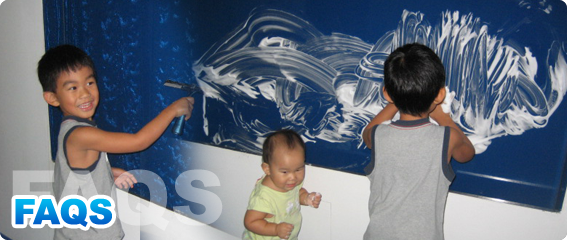General
KIDZ - Occupational Therapy Consultants accepts referrals from a wide range of sources, including:
- Self referral
- Physicians (Pediatricians)
- Clinical Psychologists, Educational Psychologists
- Therapists (Occupational, Physical, Speech and Language, Craniosacral)
- Schools (teachers, learning support, academic resource departments)
- Educational support aids/assistants, Specialist Teachers.
The frequency of session depends on each individual child’s needs and his/her family dynamics. Initially the frequency of session may be higher, however depending on his/her progress, this may reduce. Also, if the child’s advocates are able to perform more activities from home or school, this will also impact on speed of progress. Home work/ practices may be provided to support this. On some occasions, a sensory diet may be prescribed for your child as home therapy.
It depends on a variety of factors such as the severity of the child’s issues, motivation of the child, the follow-through of home therapy programs, and the various techniques and activities that are implemented.
Therapeutic Listening (TL) is an expansion of Sensory Integration. It is an auditory intervention that uses the organized sound patterns inherent in music to impact all levels of the nervous system.
Auditory information from Therapeutic Listening CDs provides direct input to both the vestibular and the auditory portions of the vestibular-cochlear continuum. The emphasis of TL is on blending sound intervention strategies with vestibular and proprioceptive input, core development, and breath activities so as to sustain grounding and centering of the body and mind in space and time. These would help assist a child in better self-regulation, and therefore, better behaviour in various settings.
- Handwriting is a complex task which needs to be learnt. There are several things that need to be developed first before proper writing is successful:
- Posture and Stability: Child has to be able to utilize core muscles appropriately to maintain good posture and stability when sitting at the table to perform writing tasks.
- Fine Motor Skills: These are required to strengthen the intrinsic muscles of the hands required for better control and strength when writing.
- Visual Perception: These include skills copying off the board, writing with appropriate spaces between words, and formation of alphabets and numbers with consistent sizes.
- Kinesthetic Awareness: This is how the pencil feels on a child’s hand, and includes child’s ability to grip the pencil appropriately.
- Ocular Motor Control: For writing to be successful, the child needs to have organized eye movement across prints, and have appropriate near-far accommodation to copy off the board.
- Before writing is trained, we have to ensure that the child meets the above at a certain standard.
Your child may have some concerns with sensory modulation or self-regulation which may cause her to be overwhelmed after going to a noisy and crowded shopping centre. This results in your child not being able to regulate himself/herself to an optimal arousal level in order to participate in a table-top task such as handwriting. In this case, there are therapy techniques which may alleviate such concerns allowing your child to participate better in their daily activities and programs in different environments.
If your child has concerns in sensory-based areas, such as being defensive, under-responsive or seeks excessive sensory inputs of touch, sounds, smells, visuals, taste; have a poor sense of balance or body awareness and discrimination, there is a possibility that your child may have a sensory integration/ sensory processing disorder. Thus, you can consider bringing your child to see a therapist at our Occupational Therapy Centre for a comprehensive sensory profile assessment.
If after conducting standardised assessments and clinical observations for your child, as well as meet up with you for a parent interview/ discussion, the therapist assesses that your child has a sensory integration/ sensory processing disorder, an individualised therapy plan will be discussed in collaboration with you to help your child manage better in different tasks and environments.
If your child’s behaviours are secondary to a primary reason such as sensory integration/ sensory processing disorder, it is likely that these behaviours will not be resolved unless appropriate therapy is provided. If after assessment, the child is diagnosed not to have a sensory processing disorder, alternative methods such as applied behavioural therapy may be applied to resolve these behaviours.
A sensory diet is an individualised activity plan, constructed to the child’s sensory needs throughout the day. If you are unsure of how to come up with the activities, you can bring your child in for an assessment, and a therapist at our Occupational Therapy Centre will discuss with you and suggest several activities to meet the individualised needs of your child.
If separation anxiety emotional reasons are ruled out, perhaps your child may have a sensory-based issue, such as being defensive to touch, sounds, smells, visual inputs, taste, have a poor sense of balance or body awareness and discrimination, which may cause him or her to be very uncomfortable or overwhelmed in noisy and crowded school environment. If that is the case, you can consider bringing in your child to centre for a sensory profile assessment.
Your child may have some concerns with sensory modulation or self-regulation which may cause her to be overwhelmed after going to a noisy and crowded shopping centre. This results in your child not being able to regulate himself/herself to an optimal arousal level in order to participate in a table-top task such as handwriting. In this case, there are therapy techniques which may alleviate such concerns allowing your child to participate better in their daily activities and programs in different environments.
best Running shoes | NIKE HOMME



